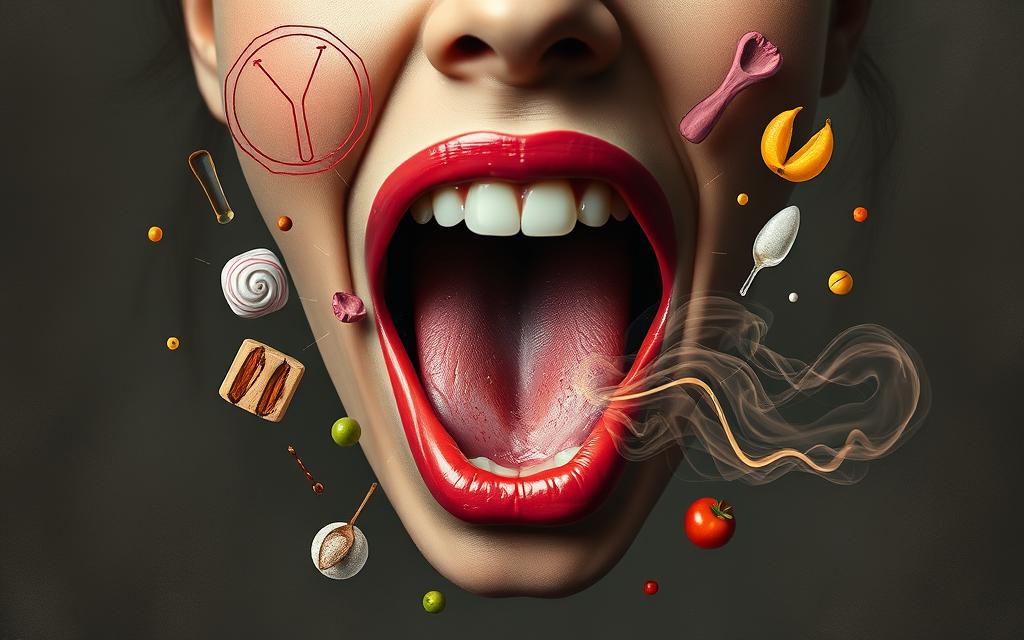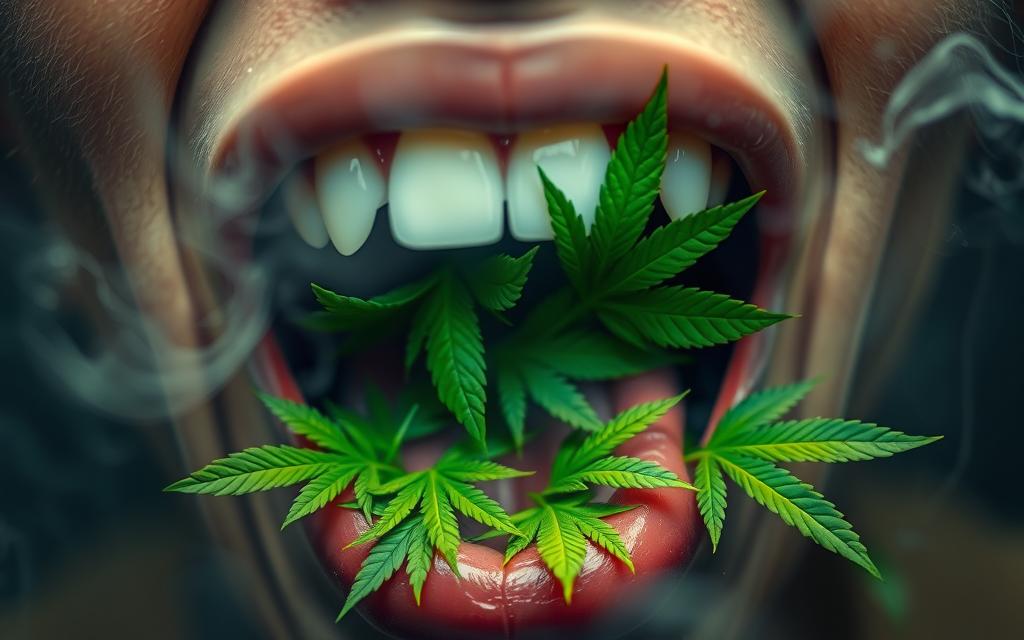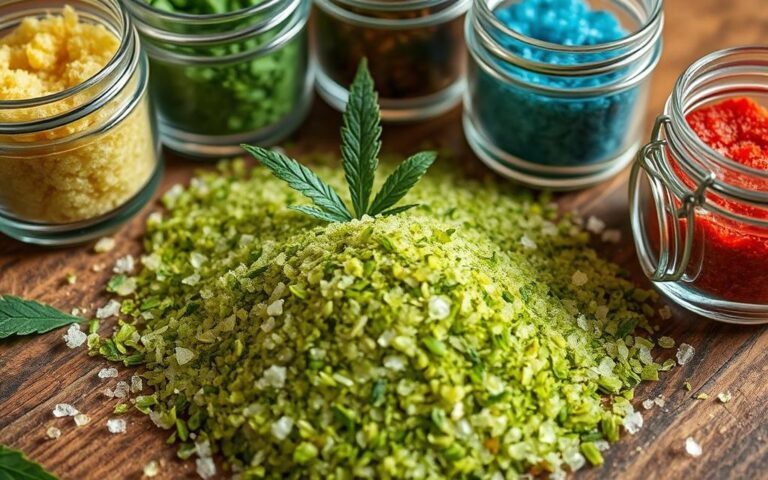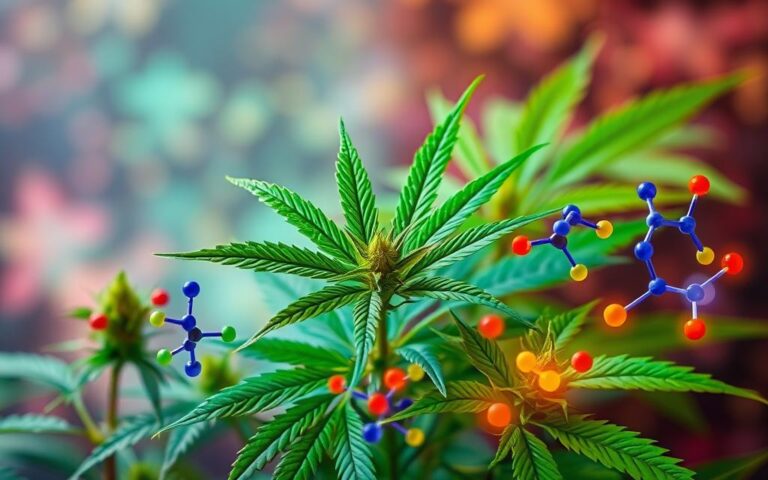Why Does My Mouth Taste Like Weed? Possible Causes Explained
Ever wonder why your mouth might taste like weed? This strange taste could mean there’s something not quite right. It might be due to dysgeusia, which is when your taste doesn’t work as it should. Knowing why could help you fix health issues that change how you enjoy life.
Each year, more than 200,000 people get help for taste or smell problems. Taste starts when special cells in your mouth react. If you notice a weird taste like cannabis, it could be a sign of health issues or side effects of medicines. It’s important to see a doctor if you notice this because it could mean something serious.
Understanding the Phenomenon of Unusual Tastes in the Mouth
Many people often get surprised by unusual tastes in their mouth. They might not notice when their taste changes. Various factors, like health or environment, can affect how we taste things.
Taste buds get stimulated by different things, leading to sensory issues. Conditions like dysgeusia can alter how we enjoy food. It can make flavours seem less enjoyable or different.
Changes in taste often come with changes in smell. This shows how connected our senses are. When we lose our sense of taste, our sense of smell often worsens too. This affects how we experience flavours.
Understanding taste disorders helps us see their impact on life. It’s vital to note how our emotions and health are linked to taste changes. If you notice different tastes, consider what might be causing them.
| Type of Taste Disorder | Description | Common Symptoms |
|---|---|---|
| Dysgeusia | Altered taste perception, often with a metallic or bitter flavour | Persistent metallic taste, changes in food preference |
| Phantom Taste Perception | Experiencing tastes without actual food present | Fluctuating taste sensations, often described negatively |
| Ageusia | Total loss of taste | Inability to taste sweet, sour, salty, bitter, or umami |
In conclusion, unusual tastes highlight the complex nature of how we perceive flavours. Understanding and addressing these disorders can help people improve their quality of life. It’s important to seek advice if you experience such changes.
Possible Medical Conditions Linked to Dysgeusia
Dysgeusia changes how you taste food, often making eating unpleasant. You may find once-loved flavours bitter, metallic, or plain bad. Many seek medical advice for these taste problems, showing the need to know more about it.
What is Dysgeusia?
Dysgeusia means your taste is off, leading to bad food experiences. It can change how you eat and enjoy meals. Studies say up to 17% of adults face dysgeusia at some point, experiencing symptoms like metal tastes, burning mouths, or finding food tasteless.
Underlying Health Issues
Many health issues can lead to dysgeusia. These include colds and exposure to certain drugs and chemicals. Conditions that might cause dysgeusia are:
- Dry mouth
- Lacking key vitamins and minerals
- Effects after chemotherapy or radiation therapy
- Brain diseases like Parkinson’s and Alzheimer’s
- Dental problems or not cleaning teeth well
Importance of Recognising Symptoms
Spotting dysgeusia early is key to getting help. If taste changes last or ruin meals, see a doctor. Doctors will check taste and smell and think about other factors that might affect taste.

The Role of Medications in Altering Taste Perception
Medications often change how things taste for many people. This problem is especially common for those taking medicine for serious health issues. Knowing about these side effects is key to deal with and recognize taste disorders.
Common Medications and Their Side Effects
Many medications can change how we taste things. For example, chemotherapy can make food taste different for 38% to 84% of patients. Antibiotics like amoxicillin might taste bitter. This can make it hard for kids to take their medicine as they should.
Older adults on several medications can also face taste issues. Indeed, over 300 drugs are linked to a metallic taste. This can lead to eating less and feeling distressed. A lack of zinc can cause taste problems too, pushing the need to see a doctor.
Consultation with Healthcare Providers
Talking to doctors about taste changes is important. They can help find out if medicine is the cause. If so, they might suggest ways to help, like better mouth care or special gums to cope with dry mouth.
To conclude, drugs that affect taste can cause health problems like weight loss or malnutrition. Talking openly with doctors can make a big difference in living better with these challenges.
Why Does My Mouth Randomly Taste Like Weed?
The taste of marijuana may linger and confuse some people. Knowing how cannabis alters taste perception helps explain this.
Impact of Marijuana Use on Taste Buds
Using marijuana often changes how taste buds work. This changes how flavours are experienced. Regular users might start liking different tastes, especially sweet or bitter ones.
This change is because cannabis affects taste bud sensitivity and how we sense flavours.
Other Substances Mimicking Cannabis Taste
Some health issues, processed foods, or chemicals might make food taste like cannabis. These flavours can make eating and drinking more complex. They show the wide range of tastes a person might find.
Importance of Diet and Taste Changes
What we eat can greatly change how we taste things. The food choices of marijuana users may shift toward very sweet or heavily seasoned food. This points out how our diet influences taste and health.
| Aspect | Impact of Marijuana Use | Other Influencing Factors |
|---|---|---|
| Taste Bud Functionality | Altered sensitivity and preference changes | Health conditions and processed foods |
| Culinary Experience | Shifts towards sweeter and more intense flavours | Mimicking taste from various substances |
| Dietary Choices | Tendency to favour spicy or sugary foods | Influence of specific food textures and additives |
Dealing with these taste changes can be hard. If cannabis causes problems, it’s a good idea to get advice. This may involve stopping use and getting help from doctors. You can find more details on these symptoms here.
The Connection Between Smoking and Taste Disorders
Smoking changes how we taste, altering our taste buds. Research shows smoking causes specific taste bud changes, affecting how we sense different flavours, especially bitter and sweet ones. These effects come from changes in the structure of taste buds and blood flow to them.
How Smoking Affects Taste Bud Structure
Studies have found that smoking can hurt taste buds. This damage leads to a lower ability to taste flavours. The key impacts include:
- Less ability to taste sweet and bitter.
- Changes in taste bud density, making taste perception less effective.
- Lower blood flow and nerve function linked to taste.
Comparative Studies on Tobacco and Skunk
Research comparing the effects of tobacco and marijuana shows different impacts on how we taste. A study with over 3,500 people looked at taste differences. Cannabis users had unique taste issues. There were 810 cannabis users in the smell test, while 714 did not use cannabis. Tobacco is known for reducing taste sensitivity. But, it works differently than marijuana.
Tobacco usually harms our sense of taste, while marijuana might make us feel more hungry and change how we sense flavours. This difference affects our eating habits because of how each substance affects our taste. Learning about these differences gives us more insight. It shows how tobacco and marijuana can change the way we experience taste.
Conclusion
The connection between taste and factors like health, medicine, and drug use is key to study. We’ve seen that many things can disrupt taste, including cannabis use. It’s the top illegal drug around the globe. Knowing the effects of taste disorders is vital, so people should watch for signs and talk to doctors if needed.
Knowing what leads to taste problems helps people take charge of their health. For example, medicine, diet, and how we live can change how things taste. This might seem small but can point to bigger health problems. Especially since regular cannabis use is linked to health issues, including breathing problems and heart attack risks.
Understanding taste problems and what they mean for our health is crucial for research. Staying aware and informed helps us improve our health and life quality. It turns the issues we face with taste into chances for improvement and positive change.










